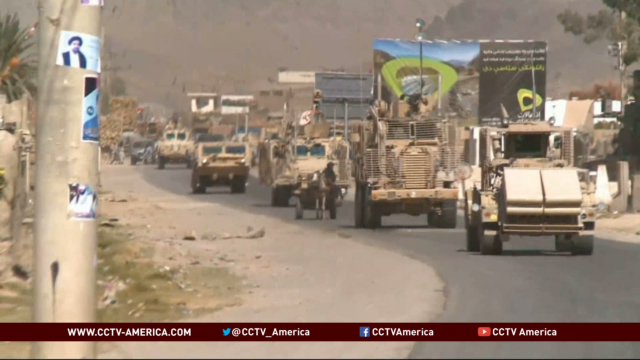As the U.S. formally ended its 13 year war in Afghanistan, the Taliban declared victory, saying the U.S. was leaving in defeat. Experts warned about a new surge in violence and raised concerns about the nation’s economy. CCTV America’s Sean Callebs reported this story from Washington, D.C.

A war that began in 2001 ended over the weekend, as the U.S.-led coalition in Afghanistan ended its combat mission. Afghanistan will now take the lead role, but foreign forces won’t be going far.
In the longest war in U.S. history, more than 2,000 U.S. troops were killed and thousands were wounded.
The Taliban issued a statement saying that the U.S.-led International Security Assistance Force rolled up its flag in an atmosphere of failure and disappointment without having achieved anything substantial.
However, some 13,000 troops will remain. Most of them are from the United States. They’ll serve as instructors for training purposes. At the war’s peak in 2010, some 140,000 U.S. troops were in Afghanistan.
A comprehensive poll by the Asia Foundation showed that more than half of all Afghans, 55 percent, believed the country was moving in the right direction. But that comes with a caveat.
“Afgans are still extremely concerned about unemployment, poor economy, corruption, and insecurity is still a top problem facing their daily lives,” Zach Warren, director of survey and research of Asia Foundation, said.
This may explain why four of ten Afghans believed the country was moving in the wrong direction.
Warren said that despite an array of problems, many Afghans believed there was a reason to be hopeful. “A lot of Afghans say the country is moving in the right direction simply because they have police or a security force. Ten years ago, there was no ANP or ANA. These are new things,” he said.
Afghan police and army forces will be responsible for the country’s safety from insurgents and the Taliban.
“We also ask, ‘Why do you think the armed opposition groups are fighting against the government?’ The two reasons given have been presence of foreign troops and to gain power, so it will be really interesting to see how that changes when the foreign troops leave,” Warren said.
The Asia Foundation survey included all of Afghanistan’s provinces and was conducted in late June and early July of this year, which was right after the presidential elections.
The presidential vote went smoother than almost anyone predicted, and at that time there was widespread optimism about the future.
“I think had we done the survey even two weeks later, we would’ve had a difference result. Things change very fast,” Warren said.
The main challenge for newly elected President Ashraf Ghani is to hold on to land gained during 13 years of war and breathe life into Afghanistan’s economy.
More than two-thirds of the country’s population is under 25. Most of its citizens lack any formal education, with 80 percent unable to read and write. Roughly 90 percent of the country’s operating budget comes from the U.S. and other nations. It’s an equation that doesn’t bode well for Afghanistan’s future.
Thomas Lynch of National Defense University on the rise of the Taliban
There’s concern about the rise of the Taliban. In fact, some experts said it’s already happening. For more on this, CCTV America talked with Thomas Lynch of National Defense University. He’s a U.S. Army veteran and a former special assistant to the chairman of the U.S. Joint Chiefs of Staff.

Many returning troops point to progress
With the draw-down in Afghanistan, many U.S. soldiers who were deployed there were now back home. That group included an Army sergeant, who said he saw progress in the country. CCTV America’s Hendrik Sybrandy reported from U.S. state of Colorado.

 CGTN America
CGTN America
